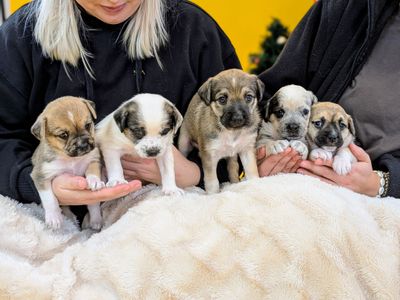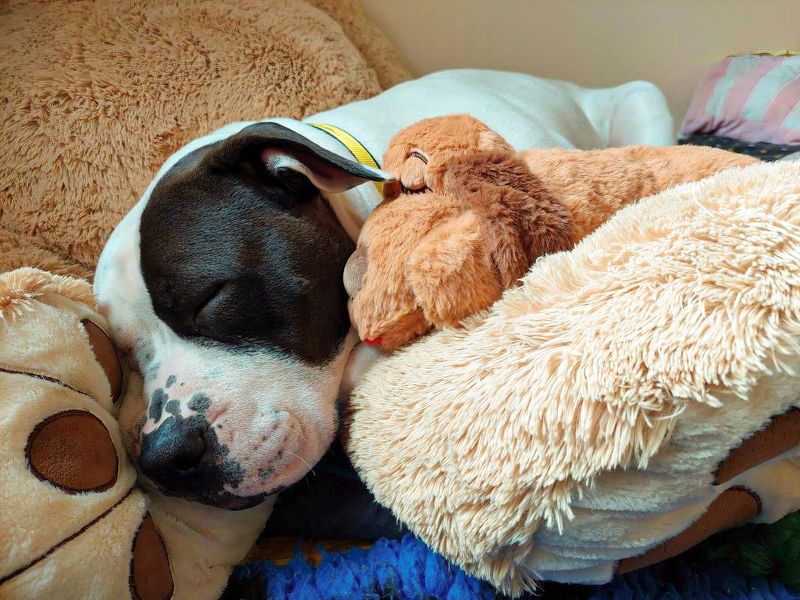
Dogs Trust research shows our pets love their ZZZs!
To mark World Sleep Day, Dogs Trust is shining a spotlight on the sleep habits of our four-legged friends.

Generation Pup - a longitudinal study of canine health, behaviour and welfare - is the UK’s most extensive study of its kind, exploring how genetics, early experiences, and the environment influence our dogs as they grow. These findings provide valuable insights into the sleep patterns and behaviours of puppies and adult dogs in home environments.
Results of the Dogs Trust sleep study, based on data from more than 3,400 of the dogs enrolled in the Generation Pup project, revealed that dogs, especially puppies, tend to sleep more during the day and prefer to be near their human companions at night.
Owners reported that puppies aged 16 weeks slept significantly longer during the day and in total over a 24-hour period than dogs aged 12 months, but for less time during the night – something important for people to be aware of when considering getting a puppy. For both ages, owners most commonly settled dogs to sleep by leaving them in a room or area without human company (59% and 54% of dogs aged 16 weeks and 12 months, respectively).
However, of dogs that could access people overnight, 87% chose to be around their people. The most common sleeping place was a kennel or crate for those aged 16 weeks (67%) and a dog bed for those aged 12 months (50%).
According to data collected through the Generation Pup study:
- Dogs Love Their Sleep: On average, the study found that dogs were reported to sleep for about 11 hours in a 24-hour period and over a third of owners observed that their dogs appeared to dream a lot during this time.
- Sleeping Arrangements: While most dogs in the study were reported to sleep in their own bed (86% of dogs slept in a dog bed, crate, or kennel), it seems there’s a bit of a snuggle culture going on—over a quarter of dogs were reported to sleep on their owner’s bed, too!
- Sweet Sleep Positions: When it comes to how they sleep, 84% of them like to stretch out or lie on their side. Many dogs also love curling up into a cosy ball, with 64% of owners reporting their dogs sleeping in this position.
- Dreaming Big: 73% of owners have noticed their dogs twitching in their sleep, and 30% have witnessed their dog “chasing something” in their dreams. Other owners reported that their dogs made noises, such as barks, squeaks or whimpers, twitched facial muscles or ears, and wagged their tails.
The study also revealed some worrying insight into the health of some of our canine friends. More than one in 10 (13%) owners reported that their dog snores loudly when asleep, and the breed most likely to snore were Pugs with their flat faces and well-documented breathing difficulties thought to contribute to this. Clumber Spaniels and French Bulldogs were also reported to regularly snore loudly. Persistent snoring in dogs can be a sign of underlying health problems such as obesity or brachycephalic airway syndrome, especially in flat-faced breeds, so it is important to discuss this with your vet if you notice your dog does this.
Jana Muschinski from Dogs Trust’s Generation Pup study says:
"It seems our dogs are living the dream—literally! From stretching out in their own bed to potentially chasing squirrels in their sleep, it’s clear that a good nap is essential for our furry friends.
“Sleep in dogs is a rarely studied but important behaviour. Changes in the pattern and duration of a dog’s sleep can reflect their wakeful experiences and how comfortable they are in their environment. Our Generation Pup study is the biggest of its kind, and the results reveal that dogs truly love their sleep and appear to regularly dream, with many owners reporting that their dogs can be seen to “chase” in their sleep.
“Many owners also reported that their dogs snore loudly. While snoring is not uncommon among dogs, regular loud snoring could be a sign that your dog may have some underlying health problems, so we encourage you to speak to your vet to have them checked over.”
Find out more about Dogs Trust's Generation Pup study:

